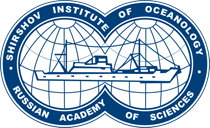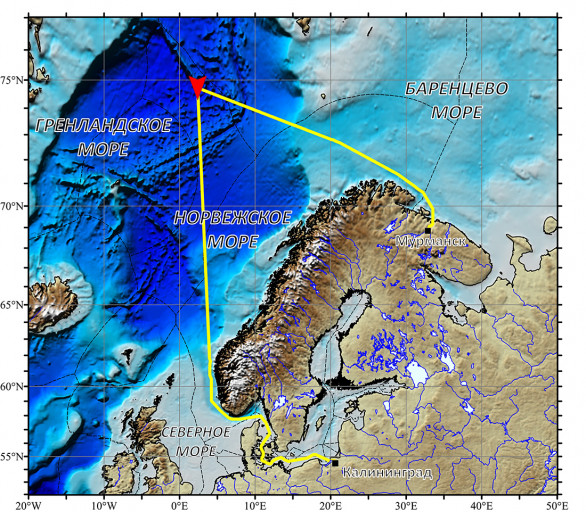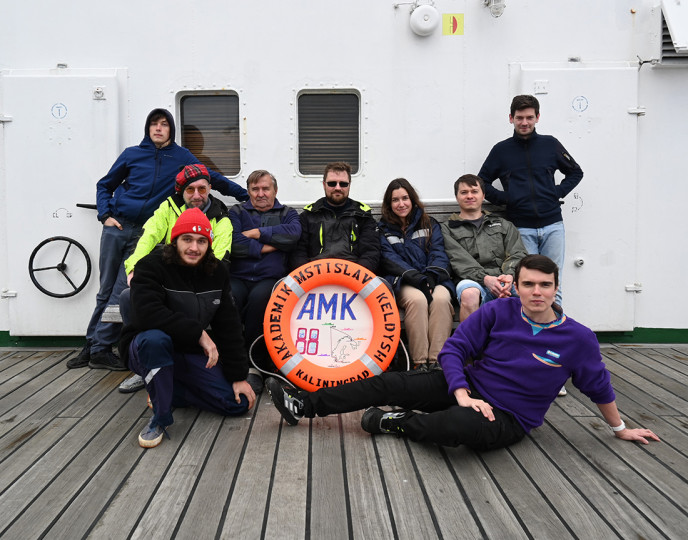From August 23 to September 04, 2022, a passing expedition on the RV Akademik Mstislav Keldysh (the 88th voyage) took place to perform work on the topic: “The role of sedimentary matter of interacting geospheres in the sedimentation of the European Arctic and Subarctic under the influence of the contact of the polar and warm Atlantic water, cold (vulture) and hot (hydrothermal) fluids”, scientific adviser leading researcher Marina Kravchishina. The head of the expedition is the leading researcher Alexey Klyuvitkin.
Expedition route
The vessel left the port of Kaliningrad and arrived at the port of Murmansk, where all participants of the 88th voyage joined the 1st stage of the next 89th voyage of the RV Akademik Mstislav Keldysh. The expedition included two teams: hydrooptics and microplastics; hydrology and AGOS (automatic deep-sea sedimentation observatories). The research was carried out within the neutral waters of the Norwegian and Greenland Seas. The variability of temperature, salinity, fluorescence and the concentration of yellow matter along the route of the vessel was studied using a flow system while the vessel was moving, and water samples were taken for the study of microplastics. At the same time, the ship's equipment was adjusted for work on subsequent expeditions, and a new complex was tested for carrying out deck optical light observations. Heavy geological samplers were prepared, in the Greenland Sea at the point with the greatest depth on the route (3700 m) test hydrological sounding was performed by the SBE911 ship complex, the surface layer of the sea was trawled with a neuston net for microplastics.
One of the objectives of the voyage was to lift the AGOS, equipped with sediment traps and recorders of environmental conditions. AGOS was installed in the neutral waters of the Greenland Sea in August 2021 during the 84th voyage of the RV Akademik Mstislav Keldysh at the point with coordinates 74° 43.5' N. and 002° 23.4' E and a sea depth of 3700 m. Continuous work with the help of AGOS in the Norwegian-Greenland basin is carried out by students and followers of the Leading Scientific School of Academician A.P. Lisitsyn for the past 5 years. During this time, 7 observatories have been successfully raised; the results of studies have been partially published and are actively cited (DOI: 10.31857/S0030157420040073, 10.31857/S2686739721030051, 10.29006/978-5-6045110-5-3, 10.29006/978-5-6045110-6-0). This is a unique material that allows you to "see" the processes occurring in the ocean throughout the year. Unfortunately, repeated attempts to lift the AGOS on the 88th flight did not lead to success.
The observatory, which worked for a year on the high seas, was to be raised during the 55th voyage of the passenger ship Akademik Sergei Vavilov. Expedition "European Arctic - 2022: geological record of environmental and climate change" led by M.D. Kravchishina was preparing at the PS Akademik Sergey Vavilov (55th voyage). Due to the lack of funding for the planned work on the ship’s register repair, the IO RAS was forced to abandon expedition work on the PS Akademik Sergey Vavilov in the summer-autumn period of 2022. Expeditionary plans for research in the European Arctic were thwarted. In accordance with the new schedule approved in August 2022, the work of the European Arctic 2022 integrated research expedition was carried out on the RV Akademik Mstislav Keldysh (88th voyage) in the neutral waters of the Greenland Sea. In addition to the IO RAS, highly qualified specialists and young scientists from 7 organizations subordinate to the Ministry of Education and Science were supposed to take part in the expedition to implement many research plans within the framework of state assignments.
The implementation of plans for marine expeditionary research in 2022 has been postponed to August–September 2023. Expedition on the topic “The role of sedimentary matter of interacting geospheres in sedimentation in the European Arctic and Subarctic under the influence of the contact of polar and Atlantic water and unloading fluids at the bottom; the study of regional features of methane emission and climate change using the Tu-134 "Optik" laboratory aircraft is planned for the RV Akademik Mstislav Keldysh to conduct multidisciplinary studies in the Norwegian-Greenland basin, the Fram Strait, the northern part of the Barents Sea, as well as in the western part of the Kara Sea using a unique scientific installation Tu-134 "Optic" laboratory aircraft.
The scientific staff of the expedition is grateful to Captain Yu.N. Gorbach and all crew members of the RV Akademik Mstislav Keldysh for their great help in implementing the scientific program of the accompanying expedition.
General photo of participants





